- Home
- Ernest Hemingway
True at First Light
True at First Light Read online
THE HEMINGWAY EBOOK COLLECTION
Across the River and Into the Trees
By-Line: Ernest Hemingway
The Dangerous Summer
Dateline: Toronto
Death in the Afternoon
A Farewell to Arms
The Fifth Column and Four Stories of the Spanish Civil War
For Whom the Bell Tolls
The Garden of Eden
Green Hills of Africa
In Our Time
Islands in the Stream
Men Without Women
A Moveable Feast
The Old Man and the Sea
The Short Stories of Ernest Hemingway
The Snows of Kilimanjaro and Other Stories
The Sun Also Rises
To Have and Have Not
The Torrents of Spring
True at First Light
Winner Take Nothing
Ernest Hemingway on Writing
SCRIBNER
1230 Avenue of the Americas
New York, NY 10020
Copyright © 1999 All rights reserved, including the right of reproduction in whole or in part in any form.
SCRIBNER and design are trademarks of Jossey-Bass, Inc., used under license by Simon & Schuster, the publisher of this work.
Copyright in and to this work is held by the copyright proprietors. No part of this book may be reproduced or translated in any form or by any means, electronic or mechanical, including photocopying, recording, or by any information storage and retrieval system, without permission in writing from the publisher.
Designed by Brooke Zimmer
First Scribner ebook edition 2002
All inquiries about print and electronic permissions (use of excerpts) for books and other works by Ernest Hemingway can be sent by email to:
[email protected], or by regular mail to Simon & Schuster, Inc., Permissions Dept., 1230 Avenue of the Americas, New York, New York 10020, or by fax to (212) 698-7284.
Visit www.simonsays.com/hemingway for additional information about Ernest Hemingway.
ISBN-10: 0-7432-4176-2
ISBN-13: 978-0-7432-4176-2
Portions of this work were previously published, in different form, in Sports Illustrated.
“In Africa a thing is true at first light and a lie by noon and you have no more respect for it than for the lovely, perfect weed-fringed lake you see across the sun-baked salt plain. You have walked across that plain in the morning and you know that no such lake is there. But now it is there absolutely true, beautiful and believable.”
—ERNEST HEMINGWAY
INTRODUCTION
THIS STORY opens in a place and at a time which for me, at least, remains highly significant. I spent the first half of my grown-up life in East Africa and have read extensively the history and literature of the British and German minorities who lived there for a brief two and a half generations. The first five chapters may be hard to follow today without some explanation of what was going on in Kenya in the Northern Hemisphere winter of 1953–54.
Jomo Kenyatta, a well-educated and widely traveled black African, a Kikuyu who had married an Englishwoman when he lived in that country, had, according to the British colonial administration of the time, returned to his native Kenya and unleashed there a black farm laborers’ insurgency called Mau Mau against the landowning immigrant farmers from Europe whom the Kikuyu believed had stolen the land from them. It’s Caliban’s grievance in The Tempest:
This island’s mine by Sycorax my mother,
Which thou tak’st from me! When thou camest first
Thou strok’st me, and made much of me, wouldst give me
Water with berries in’t, and teach me how
To name the bigger light and how the less,
That burn by day and night; and then I lov’d thee
And show’d thee all the qualities o’ th’ isle,
The fresh springs, brine pits, barren place and fertile.
Mau Mau was not the Pan-African independence movement that forty years later has finally achieved black African majority rule in the whole of the sub-Saharan continent but something, for the most part, specific to the anthropology of the Kikuyu tribe. A Kikuyu became a Mau Mau by taking a sacrilegious oath that separated him from his normal life and turned him into a kamikaze human missile aimed at his employer, the European immigrant farmer. The most common agricultural implement in the country was called in Swahili a panga, a heavy-bladed, single-edged sword, stamped and ground from sheet steel in the English Midlands, able to cut brush, dig holes and kill people under the right conditions. Almost every agricultural worker had one. I am not an anthropologist and what I am describing may be nonsense, but that’s how Mau Mau was seen by the European immigrant farmers, their wives and children. Sadly enough, the most people eventually killed and maimed by this bit of applied anthropology were not the European immigrant farming families it was designed to harm but those Kikuyu who resisted oathing and cooperated with the British colonial authorities.
What at the time of this story were known as the White Highlands, a reserve set aside exclusively for European agricultural settlement and which the Kikuyu felt had been stolen from them, lay at higher altitude and were better watered than the traditional lands of the Kamba. Although speaking a Bantu language closely related to Kikuyu, Kamba subsistence farmers needed to hunt and gather more where they lived to supplement their less reliable cultivated fields and were of necessity less site-attached than their Kikuyu neighbors. The cultural differences between the two peoples are subtle and best understood by comparing two nations that live together on the Iberian peninsula, the Spaniards and the Portuguese. Most of us know enough about these two to see why what might work with one would not appeal to the other and so it was with Mau Mau. It did not work in most instances with the Kamba and it is lucky for the Hemingways, both Ernest and Mary, that it didn’t, for they would have then stood a good chance of being hacked to death in their beds as they slept by the very servants they so trusted and thought they understood.
By the start of the threat of an outside attack on the Hemingways’ safari camp by a group of oathed Kamba Mau Mau escaped from detention has evaporated like dawn mist under the warmth of the morning sun and the contemporary reader will enjoy what follows without difficulty.
Because of my fortuitous position as number two son, I spent a great deal of time with my father during my later childhood and adolescence, the period of his marriages to Martha Gellhorn and Mary Welsh. I remember one summer when I was thirteen inadvertently walking into Papa’s bedroom at the house Marty had found for the two of them in Cuba when they were making love in one of those rather athletic ways recommended in manuals for the pursuit of happiness in married life. I immediately withdrew and I don’t believe they saw me, but when editing the story presented here and coming across the passage where Papa describes Marty as a simulator, that scene came back to me very vividly, after fifty-six years of forgetfulness. Some simulator.
Hemingway’s untitled manuscript is about two hundred thousand words long and is certainly not a journal. What you will read here is a fiction half that length. I hope Mary will not be too cross with me for making so much of Debba, a sort of dark-matter opposite to what was Mary’s real class act as a wife who did end up committing twenty-five-year-long suttee, fueled by gin instead of sandalwood.
Ambiguous counterpoint between fiction and truth lies at the heart of this memoir. Using it the author plays at length in passages that will doubtless please any reader who likes to listen to that music. I spent some time in the safari camp at Kimana and knew every person in it, black, white and read all over, and for a reason I cannot adequately explain it reminds me of some t
hings that happened back in the summer of 1942 on the Pilar when my brother Gregory and I, like General Grant’s thirteen-year-old son, Fred, at Vicksburg, spent a month as children with its remarkable crew who were in temporary service as naval auxiliaries. The radio operator was a career marine who at one time had been stationed in China. That sub-hunting summer he had an opportunity to read War and Peace for the first time, as he was only working for very short periods while on standby duty most of the day and night and the novel was part of the ship’s library. I remember him telling us all how much more it meant to him since he had known all those White Russians in Shanghai.
Hemingway was interrupted in his first and only draft of the manuscript by Leland Hayward, then married to the lady who has therefore to live by the long-distance telephone in this story, and the other movie people filming The Old Man and the Sea to go and help them fish for a picture marlin in Peru. The Suez Crisis, which closed the canal and ended his plans for another trip to East Africa, could have been one reason he never returned to his unfinished work. We know he was thinking of Paris “in the old days” from what we read in this story and perhaps another reason he left it was he found he could write more felicitously of Paris than East Africa, which for all its photogenic beauty and excitement had lasted but a few months and mauled him badly, the first time with amebic dysentery and the second with the plane crashes.
Were he still alive, I would have asked Ralph Ellison to do this introductory note because of what he wrote in Shadow and Act:
“Do you still ask why Hemingway was more important to me than Wright? Not because he was white, or more ‘accepted.’ But because he appreciated the things of this earth which I love and which Wright was too driven or deprived or inexperienced to know: weather, guns, dogs, horses, love and hate and impossible circumstances which to the courageous and dedicated could be turned into benefits and victories. Because he wrote with such precision about the processes and techniques of daily living that I could keep myself and my brother alive during the 1937 Recession by following his descriptions of wing-shooting; because he knew the difference between politics and art and something of their true relationship for the writer. Because all he wrote—and this is very important—was imbued with a spirit beyond the tragic with which I could feel at home, for it is very close to the feeling of the blues, which are, perhaps, as close as Americans can come to expressing the spirit of tragedy.”
I am pretty sure Hemingway had read Invisible Man and that it helped him pull himself together after the two plane crashes that came so close to killing both Mary and himself, when he started to write again with his African manuscript in the mid-fifties, at least a year after the events that inspired this return to creative work. He may have had Ellison in mind in his remarks in the draft manuscript about writers stealing from each other, for the scene in Ellison’s novel of the lunatics from the asylum is very much like that of the vets in the bar in Key West from To Have and Have Not.
Ellison wrote his essay piece in the early 1960s, not so long after Hemingway’s death in the summer of 1961, and Ellison, of course, had not read the unfinished African manuscript, which I have licked here into what I hope is not the worst of all possible shapes: True at First Light, taking what my father wrote in the morning and doing with it what Suetonius describes in his Lives of Illustrious Men:
“When Virgil was writing the ‘Georgics,’ it is said to have been his custom to dictate each day a large number of verses which he composed in the morning, and then to spend the rest of the day in reducing them to a very small number, wittily remarking that he fashioned his poem after the manner of a she-bear, and gradually licked it into shape.”
Only Hemingway himself could have licked his unfinished draft into the Ursus horribilis it might have been. What I offer in True at First Light is a child’s teddy bear. I will take it to bed now always and having laid myself down to sleep and prayed the Lord my soul to keep, if I die before I wake, I will pray the Lord my soul to take and God bless you, Papa.
Patrick Hemingway
Bozeman, Montana
July 16, 1998
1
THINGS WERE not too simple in this safari because things had changed very much in East Africa. The white hunter had been a close friend of mine for many years. I respected him as I had never respected my father and he trusted me, which was more than I deserved. It was, however, something to try to merit. He had taught me by putting me on my own and correcting me when I made mistakes. When I made a mistake he would explain it. Then if I did not make the same mistake again he would explain a little more. But he was nomadic and he was finally leaving us because it was necessary for him to be at his farm, which is what they call a twenty-thousand-acre cattle ranch in Kenya. He was a very complicated man compounded of absolute courage, all the good human weaknesses and a strangely subtle and very critical understanding of people. He was completely dedicated to his family and his home and he loved much more to live away from them. He loved his home and his wife and his children.
“Do you have any problems?”
“I don’t want to make a fool of myself with elephants.”
“You’ll learn.”
“Anything else?”
“Know everybody knows more than you but you have to make the decisions and make them stick. Leave the camp and all that to Keiti. Be as good as you can.”
There are people who love command and in their eagerness to assume it they are impatient at the formalities of taking over from someone else. I love command since it is the ideal welding of freedom and slavery. You can be happy with your freedom and when it becomes too dangerous you take refuge in your duty. For several years I had exercised no command except over myself and I was bored with this since I knew myself and my defects and strengths too well and they permitted me little freedom and much duty. Lately I had read with distaste various books written about myself by people who knew all about my inner life, aims and motives. Reading them was like reading an account of a battle where you had fought written by someone who had not only not been present but, in some cases, had not even been born when the battle had taken place. All these people who wrote of my life both inner and outer wrote with an absolute assurance that I had never felt.
On this morning I wished that my great friend and teacher Philip Percival did not have to communicate in that odd shorthand of understatement which was our legal tongue. I wished that there were things that I could ask him that it was impossible to ask. I wished more than anything that I could be instructed fully and competently as the British instruct their airmen. But I knew that the customary law which prevailed between Philip Percival and myself was as rigid as the customary law of the Kamba. My ignorance, it had been decided long ago, was to be lessened only through learning by myself. But I knew that from now on I had no one to correct my mistakes and, with all the happiness one has in assuming command, it made the morning a very lonely one.
For a long time we had called each other Pop. At first, more than twenty years before, when I had called him Pop, Mr. Percival had not minded as long as this violation of good manners was not made in public. But after I had reached the age of fifty, which made me an elder or Mzee, he had taken, happily, to calling me Pop, which was in a way a compliment, lightly bestowed and deadly if it were withdrawn. I cannot imagine a situation, or, rather, I would not wish to survive a situation in which I called him, in private, Mr. Percival or he addressed me by my proper name.
So on this morning there were many questions I wished to ask and many things I had wondered about. But we were, by custom, mute on these subjects. I felt very lonely and he knew it of course.
“If you did not have problems it would not be fun,” Pop said. “You’re not a mechanic and what they call white hunters now are mostly mechanics who speak the language and follow other people’s tracks. Your command of the language is limited. But you and your disreputable companions made what tracks there are and you can make a few new ones. If you can’t come up with the pr
oper word in your new idiom, Kikamba, just speak Spanish. Everyone loves that. Or let the Memsahib talk. She is slightly more articulate than you.”
“Oh go to hell.”
“I shall go to prepare a place for thee,” Pop said.
“And elephants?”
“Never give them a thought,” Pop said. “Enormous silly beasts. Harmless everyone says. Just remember how deadly you are with all other beasts. After all they are not the woolly mastodon. I’ve never seen one with a tusk that made two curves.”
“Who told you about that?”
“Keiti,” Pop said. “He told me you bag thousands of them in the off-season. Those and your saber-toothed tiger and your brontosauruses.”
“The son of a bitch,” I said.
“No. He more than half believes it. He has a copy of the magazine and they look very convincing. I think he believes it some days and some days not. It depends on whether you bring him any guinea fowl and how you’re shooting in general.”
“It was a pretty well illustrated article on prehistoric animals.”
“Yes. Very. Most lovely pictures. And you made a very rapid advance as a white hunter when you told him you had only come to Africa because your mastodon license was filled at home and you had shot over your limit on saber-toothed tiger. I told him it was God’s truth and that you were a sort of escaped ivory poacher from Rawlins, Wyoming, which was rather like the Lado Enclave in the old days and that you had come out here to pay reverence to me who had started you in as a boy, barefoot of course, and to try to keep your hand in for when they would let you go home and take out a new mastodon license.”
“Pop, please tell me one sound thing about elephants. You know I have to do away with them if they are bad behaving and if they ask me to.”
“Just remember your old mastodon technique,” Pop said. “Try and get your first barrel in between that second ring of the tusk. On frontals the seventh wrinkle on the nose counting down from the first wrinkle on the high forehead. Extraordinary high foreheads they have. Most abrupt. If you are nervous stick it in his ear. You will find it’s simply a pastime.”

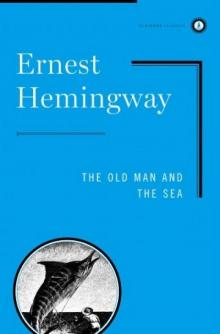 The Old Man and the Sea
The Old Man and the Sea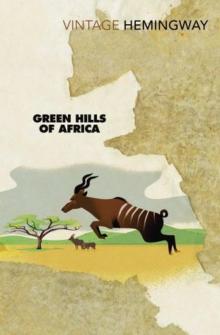 Green Hills of Africa
Green Hills of Africa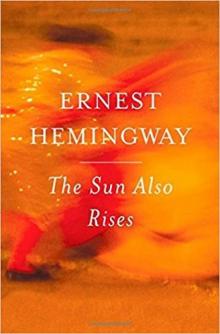 The Sun Also Rises
The Sun Also Rises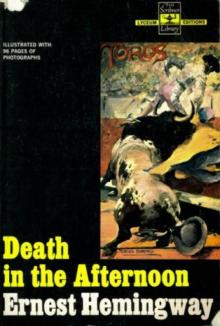 Death in the Afternoon
Death in the Afternoon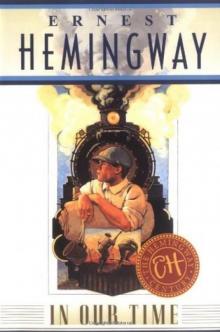 In Our Time
In Our Time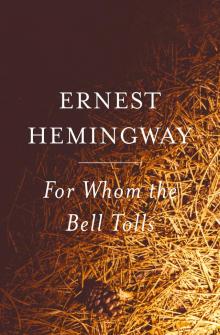 For Whom the Bell Tolls
For Whom the Bell Tolls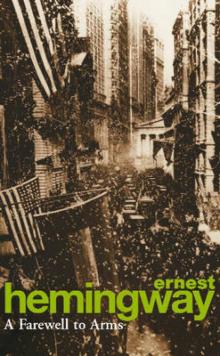 A Farewell to Arms
A Farewell to Arms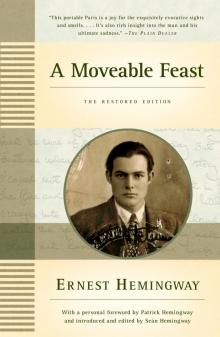 A Moveable Feast
A Moveable Feast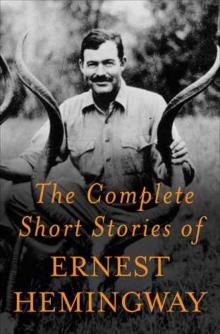 The Complete Short Stories of Ernest Hemingway
The Complete Short Stories of Ernest Hemingway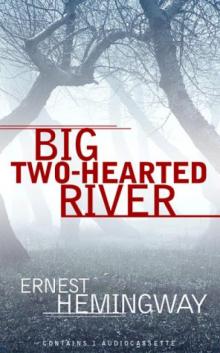 Big Two-Hearted River
Big Two-Hearted River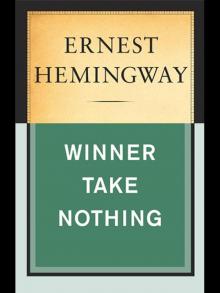 Winner Take Nothing
Winner Take Nothing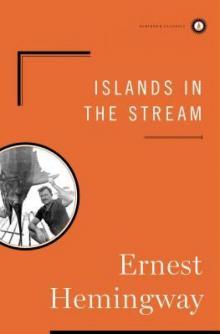 Islands in the Stream
Islands in the Stream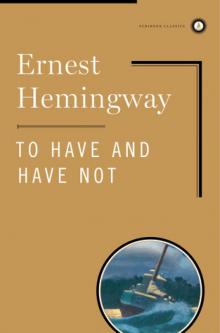 To Have and Have Not
To Have and Have Not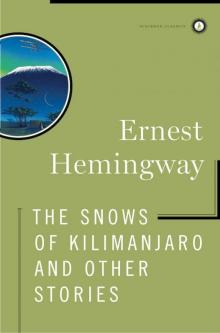 The Snows of Kilimanjaro and Other Stories
The Snows of Kilimanjaro and Other Stories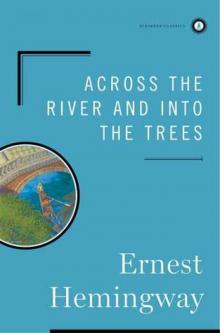 Across the River and Into the Trees
Across the River and Into the Trees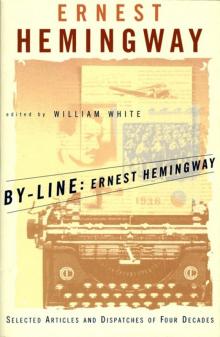 By-Line Ernest Hemingway
By-Line Ernest Hemingway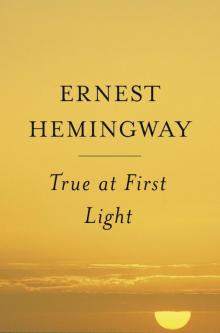 True at First Light
True at First Light Men Without Women
Men Without Women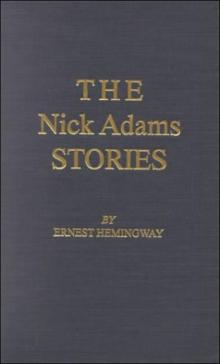 The Nick Adams Stories
The Nick Adams Stories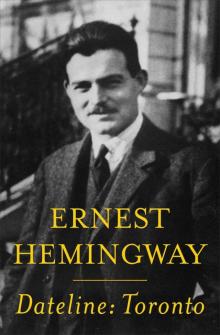 Dateline- Toronto
Dateline- Toronto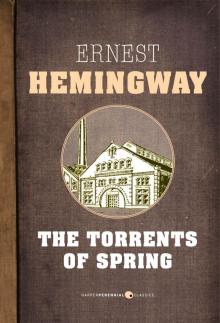 The Torrents of Spring
The Torrents of Spring Short Stories
Short Stories